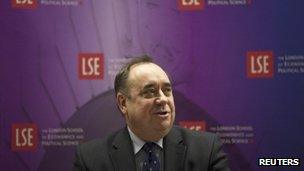Scottish independence: Oil fund 'raises budget questions'
- Published

The first minister said earmarking a tenth of oil and gas tax revenues could mean a £30bn fund in 20 years
Establishing an "oil fund" in an independent Scotland would not necessarily be the best approach for Scotland's economy and its future generations, according to a think tank.
Last week First Minister Alex Salmond said earmarking about a 10th of oil and gas tax revenues could lead to a £30bn fund over a generation.
The Centre for Public Policy for Regions said an oil fund was viable.
But it warned establishing such a fund would mean difficult budget decisions.
And it questioned whether, given existing budget constraints, an oil fund would make the best use of a source of tax revenues.
In a lecture last week at the London School of Economics, Mr Salmond outlined his ambition to use the energy economy to create multi-billion pound wealth for an independent Scotland.
He cited Norway as a good example of a country using an oil fund for the future.
Mr Salmond also argued setting aside about £1bn a year of oil and gas tax revenues could lead to a £30bn fund over 20 years.
But he added that such a fund for Scotland would only happen "once fiscal conditions allow".
In a report, the Glasgow University-based Centre for Public Policy for Regions (CPPR) said an oil fund for Scotland could be desirable on economic grounds.
But it said establishing such a fund would mean some very difficult decisions would need to be taken, in the absence of oil prices and production far exceeding current expectations.
Its report argued: "Very careful consideration would need to be given as to what transition will be necessary for such a fund to be built up.
"At existing oil prices and production levels, all North Sea taxes are, and will continue to be needed, to help fund the deficit that emerges from maintaining existing levels of public services.
"There is little prospect of any surplus becoming available for an oil fund, and certainly not of the size being suggested."
The report also claimed that generating an oil fund of £30bn within 20 years from an annual investment of £1bn required a substantially higher annual compound return than the 2% to 3% achieved by the Norwegian government's oil fund.
Budget 'challenges'
Report co-author Jo Armstrong said "Investing £1bn each year in an oil fund will add to the Scottish government's budget challenges.
"With current oil prices and more importantly, with declining North Sea production, such a level of investment will put current service levels at risk or will require adding to Scotland's debt levels."

The first minister outlined his vision for a Scottish oil and gas fund in a lecture at the LSE
CPPR director Richard Harris said: "Whilst the inter-generational equity arguments for a fund may appear strong, it is by no means clear that establishing a fund and releasing funds in 20 years' time will necessarily be the best approach for Scotland's economy and its future generations."
Responding to the report, a spokesman for the Scottish government said figures from the Government Expenditure and Revenue Scotland (GERS) demonstrated that, from 2005 to 2010, Scotland was in a stronger financial position than the UK as a whole.
He added: "Taking all spending in Scotland into account and all of our revenues, Scotland has run a current budget surplus in four of the five years to 2009-10 - while the UK was in current budget deficit in each of these years, and hasn't run a current budget surplus since 2001-02."
Scottish Labour finance spokesman Ken Macintosh described the report as a "powerful and serious piece of work".
He said: "If Scotland started an oil fund in the same year as Norway, the current balance would be zero because we spend more on public services than we raise in tax.
"This debate is about the choices governments make. Norway has chosen to put money in a bank account - Scotland has chosen to invest in public services.
"If Alex Salmond wants to change that, he needs to spell out what further cuts he is proposing because you can't spend the same money twice."